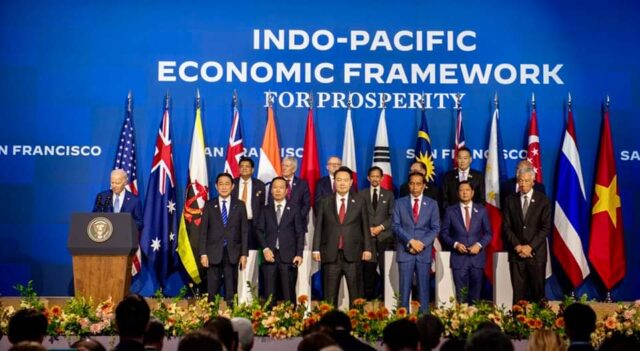On November 16, India, along with 13 of its Indo-Pacific Economic Framework (IPEF) for Prosperity partner nations, signed the IPEF Supply Chain Agreement. Following that, they have announced the conclusion of the IPEF Clean Economy Agreement, the IPEF Fair Economy Agreement, and the Agreement on the Indo-Pacific Economic Framework for Prosperity. The Minister of Commerce and Industry, Mr. Piyush Goyal, was present for the meeting in San Francisco. Apart from India, the meeting was attended by the other IPEF nations: Australia, Brunei Darussalam, Fiji, Indonesia, Japan, the Republic of Korea, Malaysia, New Zealand, the Philippines, Singapore, Thailand, the United States, and Vietnam. During the course of this ministerial meeting, the member nations announced major milestones under Pillar II (supply chain), Pillar III (clean economy), and Pillar IV (fair economy).
The IPEF Clean Economy Agreement:
The Clean Economy Agreement enables the IPEF partners to strive for the common goal of net-zero emission economies while at the same time ensuring sustainable growth for the member nations. In that light, the agreement proposes solutions to critical issues like efforts towards climate resilience and adaptation, energy security and transition, the promotion of sustainable livelihoods and just transition, and greenhouse gas emissions mitigation. Some of the agreed-upon solutions are: strengthening clean energy supply chains across markets; promoting energy efficiency, renewable energy, and energy conservation; reducing methane emissions by 2030; decarbonizing the transport sector, etc. The agreement also seeks to increase investment in those regions that are particularly affected by the climate crisis and in acute need of financing. The agreement would also facilitate the initiation and exploration of new Cooperative Work Programs (CWPs) that would help design a detailed framework for cooperation among nations.
The IPEF Fair Economy Agreement:
Under the Fair Economy Agreement, the IPEF member nations would strive to promote fairness, transparency, inclusiveness, the rule of law, and accountability in their respective economies in order to improve the atmosphere of trade and investment in the Indo-Pacific region. Through the Agreement, the member nations would actively work to detect, prevent, and raise awareness against corruption and bribery in accordance with the United Nations Convention against Corruption (UNCAC) and the Organization for Economic Cooperation and Development (OECD) Anti-Bribery Convention. The involvement of the private sector in the above task is also a proposed means of improving the respective economies, if needed. Apart from this, the agreement also obliges the partners to hold annual coordination meetings to discuss issues of anti-corruption, labor, and tax; monitor proposed implementation; and further the public-private dialogue for the same.
Agreement on the IPEF for Prosperity:
A substantial conclusion of the negotiations on the IPEF for Prosperity included a proposal to establish an IPEF Council and Joint Commission. This is believed to ensure consistent, ongoing cooperation at the ministerial level. While the IPEF Council would help coordinate the operation of all the above agreements, the Joint Commission is expected to monitor all agreements under Pillars II–IV.
The IPEF Supply Chain Agreement:
The 14 member nations have acknowledged the necessity of working together on supply chains. This would necessarily induce a better understanding of regional supply chains, improve crisis response facilities in case of supply chain disruptions, and promote workforce development and labor rights across IPEF supply chains.
The IPEF was launched in Tokyo, Japan, in May 2022. Since then, the partners have held bilateral meetings at various levels, virtual intersession meetings, and in-person negotiations, all the while engaging a wide range of stakeholders. The partners have decided to convene the next IPEF Clean Economy Investor Forum meeting in Singapore in 2024 to facilitate investment in climate technology and sustainable infrastructure.









